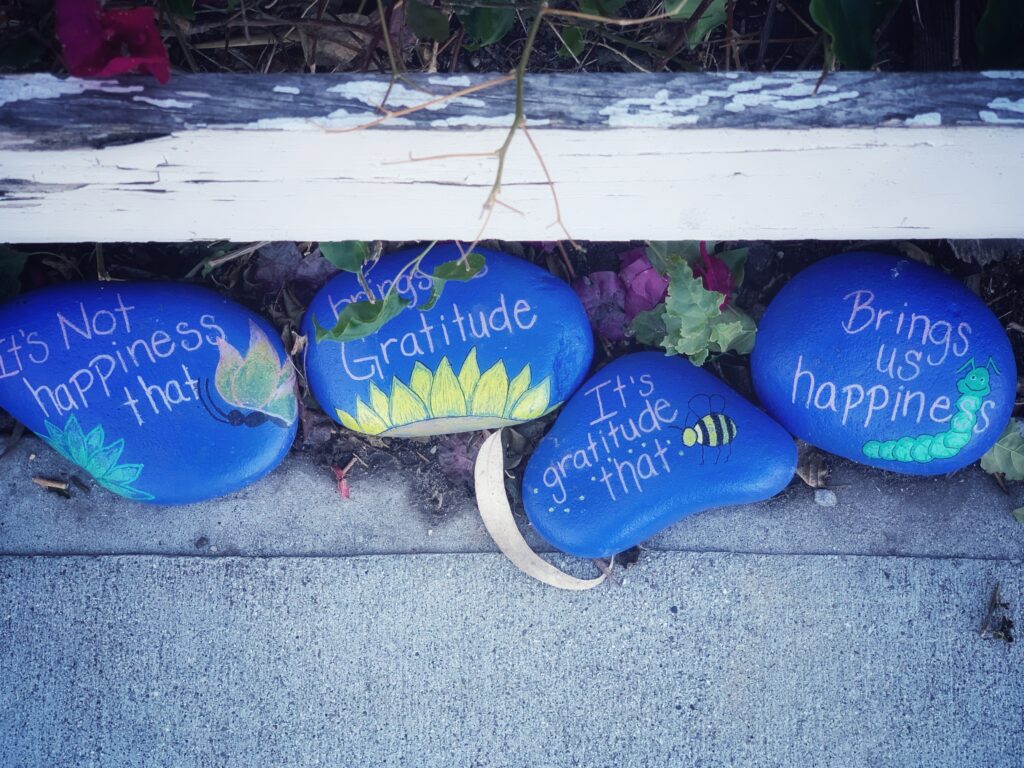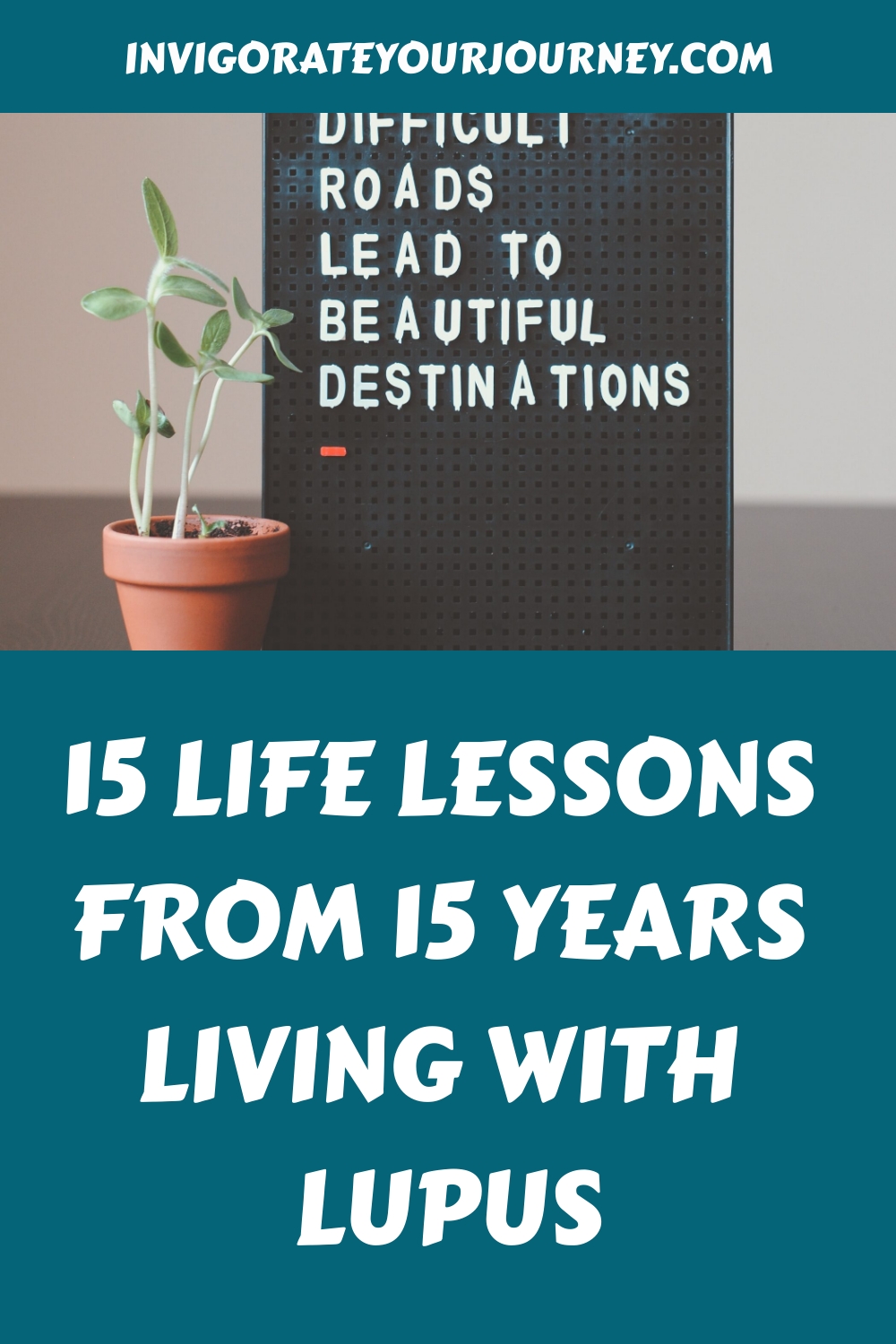It’s been 15 years since I was diagnosed with Systemic Lupus Erythematosus (SLE), which primarily manifested itself with debilitating arthritis and organ complications. My path has been challenging (sometimes at my own doing ;-), but it’s been incredibly fulfilling once I embraced my journey with an autoimmune disease.
I’ve gone through periods where I took my medication but flat-out ignored self-care and ruthlessly pushed through an overcommitted schedule. I sent emails from my hospital bed post-total-knee-replacement surgery. Not smart. That only works for so long before illness catches up with you. And mine certainly did.
Thank God.
Lupus has changed my life, and I’m grateful to be able to share the information and insights I’ve learned over the past 15 years, which have helped me navigate the challenges of living with Lupus and transformed my life profoundly. While they may not all resonate with you now, I encourage you to stay curious. My life changed when I got curious.
1. Have Faith.
I got a text from a friend to go on a ski trip. I declined because I was hooked up to an IV in the ICU, receiving blood thinners to dissipate the extensive blood clots in my lungs.
At 23 years old, I felt like the world was passing me by as I stared out my hospital window, losing hope that I would not get to participate in life the way I envisioned. The stark contrast between my friends’ vibrant adventures and my hospital view left me feeling robbed of the life I had anticipated.
I want to say it was in that hospital room I leaned into my faith, but instead, I pulled away, grappling with the unfairness of my situation. However, my persistence shone through as I clung to positivity, celebrated small victories, and embraced gratitude. This persistence birthed profound thankfulness for the present moment and a renewed hope for the future.

Hindsight gifted me the realization of my sheer fortune to be alive, a perspective I had lost in the throes of despair. Whether you find solace in God, the universe, or another form of faith, opening yourself to its abundance becomes a beacon in the darkest hours.
It’s a testament to the resilience of the human spirit, forging hope from adversity and discovering that, even in the hospital’s quiet, the pulse of life beats with profound gratitude and unwavering hope.
2. Get Clear on Your Purpose and Values.
Your purpose, or life’s mission, is your North Star. This guiding light helps you align your priorities with your evolving life circumstances. Your values act as guardrails, ensuring you stay on the right path even when life throws you off course.
When you’re faced with an autoimmune disease like Lupus, it can be easy to feel lost or overwhelmed by the weight of an intense chronic illness. That’s precisely why we need to get clear on our purpose. Purpose provides resilience.
Your North Star and values provide the resilience you need to keep moving forward. It’s not always straightforward; sometimes, these diseases can be downright brutal, but having a clear sense of purpose and values can help you find beauty and love even in the most challenging moments.
3. Get Thanking.
Expressing gratitude for the abundance in our lives is a gesture of appreciation and a powerful catalyst for personal growth. It is through this act of thankfulness that we find our true purpose.
When we concentrate on our journey’s “why” and “who,” we transition into profound gratitude; it’s a reminder that our pursuit of becoming the best version of ourselves is closely intertwined with the people who support and inspire us.

Gratitude fuels our desire to give back, and we find fulfillment most rewarding in serving others. It’s a beautiful cycle of self-improvement and selflessness that enriches our lives and those around us.
Fun Fact: When we practice gratitude, our bodies make immunoglobulins – our natural defense against viruses and bacteria – and our immune systems strengthen along with other health benefits!2
4. Self-Respect is Vital.
Early on in my autoimmune journey, my priorities were out of order. I was focusing on too many things, and because I was stretched too thin, I wasn’t being my best self at any of it, especially for my family. Naturally, insecurities, self-doubt, and guilt plagued my thoughts.
Thankfully, my close friends and mentors supported me through those dark times of self-doubt. Find people who will see the best in you, even when you can’t see it yourself.
But ultimately, it has to come from within. Restructuring my life to align with my values gave me the space to stand up for my family in a way I previously didn’t realize was possible with an autoimmune disease.
The values allowed me to cut out the chaos and be hyper-intentional about where and how I spend my time. When I structured my day and created routines aligned with my values, self-confidence and self-respect followed.
Knowing I’m striving daily to live by my values provides self-worth and love for myself and those around me. Journaling about my accomplishments has trained my brain to focus on the value I’m providing vs. the endless tasks I didn’t get to on my to-do list.
If you’re struggling with self-doubt, go back to lesson one 🙂
5. Failure is the Essential Ingredient for Growth.
In our success-driven culture, failure is often viewed as a stumbling block, a setback, or something to be avoided at all costs. However, the reality is quite the opposite. Failure is not a sign of weakness or incompetence but an essential ingredient for growth and personal development.
This is especially true when living with a chronic illness inherently involves facing adversity. Flare-ups, pain, and unpredictable symptoms can be disheartening and discouraging. Yet, it’s in these moments of struggle that resilience is forged. Resilience is the ability to bounce back from setbacks, a quality that can be cultivated through experiencing and overcoming failure.
Failure is a potent teacher. Trying something that doesn’t work out as planned is an opportunity to gain new insights and knowledge. This newfound understanding can lead to more informed decisions and strategies for the future. In the realm of chronic illness, learning from failure can be life-changing.

For example, suppose you’ve experimented with a particular dietary approach to manage Lupus or another autoimmune disease, and it didn’t yield the expected results. In that case, it doesn’t mean the effort was in vain. It means you now have valuable information about what doesn’t work for you. This knowledge can guide you towards more effective solutions and a better understanding of your own body.
Failure tests your mettle and pushes you beyond your comfort zone. It forces you to adapt, learn, and persevere. In the context of autoimmune disease, a failed attempt at managing your symptoms or a setback in your treatment plan can be seen as an opportunity to learn about yourself, refine, and go again. Setbacks allow you to develop the resilience needed to face future challenges. Each failure is not a stumbling block but a stepping stone.
6. Orchestrate Your Life to Create a Symphony.
The saying, “If you don’t make time for your wellness, you’ll be forced to make time for your illness,” resonates strongly with my journey. Like many, I was stubborn and pushed through the pain and fatigue.
It took a hospital stay for me to reevaluate my lifestyle and learn about epigenetics (definition), which taught me that we have more control over our health than we previously thought. Prioritizing wellness is an investment in your future well-being.
Wellness isn’t just about physical health; it’s about holistic well-being. For instance, getting enough sleep does more than give you more energy; adequate sleep (7-8 hours) can:
- Boost your immune system and make vaccines more effective
- Help prevent weight gain by repressing cravings and appetite
- Strengthen your heart
- Elevate your mood and reduce feelings of annoyance, irritant, and anger
- Improves memory – how about that for brain fog!4
It’s more than just getting enough sleep or eating the right foods. Those actions that seem to have a singular effect on our health contribute to other aspects of our health.

While we tend to look at these health aspects in silos, it’s essential to consider a holistic approach. Practice each instrument, learn how their sounds interact, refine until we have music, and optimize until we have a symphony.
When you hear an off-tune sound, revisit the instrument. We’re continuously evolving; staying in tune is critical to creating beautiful music.
7. Stand Up Every Day: Persistence and Patience.
With autoimmune challenges, standing up every day transcends the physical act. Standing might be symbolic sometimes, finding alternative ways to engage with life and work towards your goals.
On days when physical limitations prevail, it’s a moment for gentle stretching or immersing yourself in an informative podcast.
Regardless of its form, this daily commitment becomes a testament to persistence and patience. It’s a declaration that you actively participate in your journey, no matter the circumstances.
By remaining engaged amidst autoimmune challenges, we anchor ourselves to our purpose and values, shielding ourselves against the encroaching shadows of hopelessness. Standing up embodies resilience in whatever manifestation is feasible on a given day.
Persisting and persevering through the unpredictability of autoimmune conditions is a marathon, not a sprint. We may not discern the tipping point where the tides turn, but the unwavering faith in its existence fuels the patience and fortitude needed to stand up every day.
No matter how small, each act propels us forward, reaffirming the journey is not just about reaching the destination but about the strength found in the daily steps and who we become in the process.
8. Making the Hard Choice Now Makes Life Easier for Your Future Self.
Making challenging choices today is an investment in a smoother, more fulfilling future. Whether it’s battling the allure of sugar, the endless scroll of social media, or the captivating abyss of Netflix, our vices can exert a powerful pull.
These distractions not only hinder productivity but can also derail our overall well-being.
Establishing routines and systems as a barrier against these temptations becomes crucial. Doing so reduces decision fatigue and creates an environment conducive to healthier choices.
It’s about recognizing that hard choices pave the way for a future where well-being is prioritized and distractions lose their grip. Implementing these structures is a form of self-care that echoes through time, making the journey toward a healthier and more focused self an achievable and sustainable endeavor.
To learn more about setting yourself up for success, see the post: How to Turn Bad Habits into Healthy Habits by Addressing 6 Sources that Influence Our Behavior
9. Have Empathy for Your Supporters.

The impact of autoimmune diseases ripples through the lives of those around us, touching family, friends, neighbors, and co-workers. Often, they bear the weight of these diseases with a unique kind of strength.
While we navigate the challenges firsthand, they find themselves on the sidelines, offering support and encouragement but feeling powerless. Living with an autoimmune condition becomes a shared journey, a test of patience not just for us but for our steadfast supporters as well.
Transparency about our diseases becomes a bridge, helping them comprehend our situations and offer more meaningful support.
To the friends and loved ones supporting individuals navigating autoimmune diseases like Lupus, your unwavering support, prayers, and positive vibes are like a lifeline, lifting us more than you may realize.
Your understanding is a source of strength, and your presence on this journey is profoundly appreciated. Thank you for standing by us, making the burden a little lighter, and being an integral part of our resilience.
10. Take Heat.
Taking heat and holding oneself accountable can be an uncomfortable journey, especially when faced with the blush of embarrassment. The instinct to retreat or hide is powerful, but it is precisely in these moments that growth and a life of integrity are forged. Accountability is the crucible in which our character is shaped, and while the path may be challenging, it is essential for personal development.
In the allegorical tale of YOU GOT THIS, KID! Leadership Advice for Young Leaders,3 the armadillo, Alex, symbolizes resilience with thick skin. This metaphorical armor is developed by understanding what truly matters.
When faced with challenges outside our comfort zone, revisiting our intentions and values becomes the wellspring of courage. For me, grappling with autoimmune disease has fortified my mission and strengthened my values, serving as a steadfast reminder that my purpose lies in serving and aiding others through unwavering integrity.
Family, the cornerstone of my support system, anchors me to what truly matters. Their presence reinforces my commitment to living a life aligned with my mission and values. It’s a challenging yet profoundly rewarding journey that fuels personal growth and ensures that the heat we face refines us rather than scalds us.
11. T.I.M.E. – Today Is My Everything1.
In the intricate tapestry of time, the present moment stands as the most precious thread—undeniably significant and profoundly impactful. Today is not just a day; it’s an embodiment of opportunities. T.I.M.E. is a poignant reminder to do everything with Intention, Mindfulness, and Engagement.
The past, a repository of memories, is unalterable. What lingers are the moments that stir our emotions, be it joy or sorrow. Meanwhile, the future remains a vast expanse of uncertainty, where studies suggest that a staggering 90% of our thoughts and worries never materialize5. By anchoring ourselves in the present, we liberate our minds from the shackles of an unpredictable future, allowing us to savor the beauty of the now.

This singular moment is our only guarantee—a canvas waiting for our purposeful strokes. Are we taking positive actions or succumbing to habits that might hinder our future selves?
Every positive step, like engaging with this post to learn about living with autoimmune diseases, is a stride toward progress. Focusing on the present provides the clarity and space to live intentionally, ensuring that each choice contributes to a purposeful and fulfilling journey.
12. Turn Off the Noise.
The constant barrage of stimuli. The digital age has given us unprecedented access to information and connectivity but has also brought a relentless wave of noise into our lives. From the moment we wake up to when we go to bed, we’re bombarded with news updates, social media notifications, emails, television programs, and a never-ending music playlist.
While it may seem like we’re in control of this digital cacophony, the truth is that it often controls us. We find ourselves tethered to our devices, compulsively checking for updates, and perpetually distracted. This constant state of sensory overload can have detrimental effects on our mental and emotional well-being. For those of us living with chronic illnesses like Lupus, it can exacerbate stress and symptoms.
That’s where the concept of “turning off the noise” becomes not just a luxury but a necessity. Taking deliberate moments to disconnect from the chaos of the modern world can be incredibly healing, restorative, and therapeutic.
13. One Step at a Time.
When you’re living with a chronic illness, the journey ahead can feel daunting. Managing symptoms, making lifestyle adjustments, and coping with the emotional toll can make the road seem endless. At this point, the wisdom of taking one step at a time becomes invaluable. Breaking your journey down into manageable steps is not just a strategy; it’s a lifeline that can help you navigate the turbulent waters of chronic illness.
Life is full of complexities, and chronic illness introduces a unique set of challenges. However, approaching it one step at a time allows you to gain control and perspective over your situation. Understand that progress is progress, no matter how small it may seem. The incremental changes you make today can add up to substantial transformation over time.

Celebrate the daily victories, whether adhering to your medication regimen, practicing self-care, or simply getting out of bed on a difficult day. Remember, taking one step at a time doesn’t just apply to your physical health; it’s equally relevant to your mental and emotional well-being.
Dealing with a chronic condition can be emotionally taxing, and it’s crucial to address your mental health with the same measured approach. Seek support when needed, whether through therapy, support groups, or talking to trusted friends and family. Every step you take to prioritize your emotional health is a significant stride toward overall well-being.
Ultimately, the path to wellness, especially when living with autoimmune disease, is not a sprint but a marathon. It’s a continuous journey with its ups and downs. Embrace this long-term perspective and the practice of taking one step at a time. It allows you to build resilience, develop a deeper understanding of your condition, and live a meaningful life at a pace that suits your unique needs.
14. Continuous Learning Fuels the Soul.
In the ever-evolving landscape of life, the key to staying vibrant and relevant is embracing continuous learning and nurturing an insatiable curiosity. The world is a vast repository of knowledge, and constant learning is a dynamic dance with the ever-expanding boundaries of information. It’s a commitment to growth transcending age, circumstance, and experience.
To stay curious is to cultivate a mindset that sees every encounter as an opportunity to glean insights and broaden perspectives. The fuel propels us to ask questions, seek understanding, and approach challenges with a zest for discovery.
In a world where change is the only constant, those who embrace continuous learning and stay curious are the ones who not only navigate the currents of transformation but thrive in its embrace.
15. Gumption: Keep Doing the Hard Things.
Gumption is the compass that steers us through the stormy seas of life, urging us to persist and persevere even when the path ahead seems arduous and uncertain. In pursuing our dreams, embracing the hard things is crucial, even when they appear messy or impossible. Your North Star, that unwavering guide within, continues to shine, casting its light through the challenges that may unfold.
The journey toward your aspirations may not always unfold in a neat, linear trajectory; it’s an intricate tapestry woven with threads of hope and potential. As you navigate the twists and turns, remember that the path’s difficulty doesn’t diminish the brilliance of your North Star.

It’s a reminder that the dream is worth every effort, every stumble, and every leap of faith. So, keep doing the hard things, for it is in the crucible of challenges that the true strength of your aspirations is revealed, and the journey becomes a testament to your resilience and unwavering commitment to your dreams.
Living with a chronic illness like Lupus presents unique challenges, but it also offers opportunities for growth, resilience, and transformation. Over 15 years, I’ve learned valuable lessons that have not only transformed my life but have the potential to inspire positive change in anyone facing adversity.
As you navigate your journey, whether related to chronic illness or any other challenge, remember there is always hope. Embrace the path before you, set your values, and follow your North Star; life will reward you far beyond your wildest dreams.
Thanks for reading to the end 🙂
Dance on, friends,
Karin
In remembrance of Kevin Gerard Moder, M.D.
Your diligence, calm bedside manner, and genuine care for your patients saved my life. Thank you for selflessly serving the lupus community and being a bright light in every life you touched. I’ll forever be grateful.
Read more about Dr. Moder (Obituary)
Sources
- Anti-Time Management: Reclaim Your Time and Revolutionize Your Results with the Power of Time Tipping, by Richie Norton
- UCDavis Health: Gratitude is good medicine.
- YOU GOT THIS, KID! Leadership Advice for Young Leaders, by Chuck Saia
- Intermountain Health: Benefits of Getting a Full Night’s Sleep
- National Library of Medicine: Anxious Thoughts

 Karin W
Karin W 







